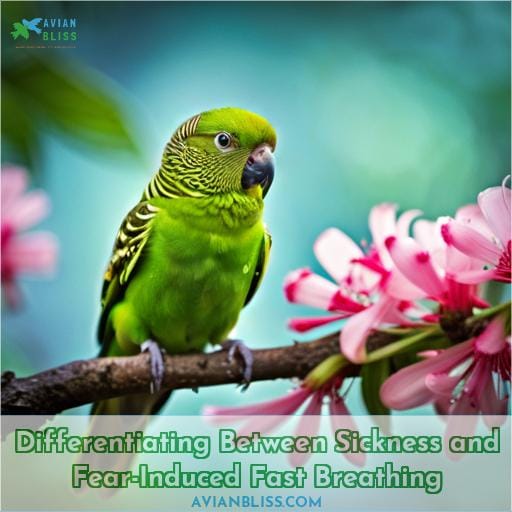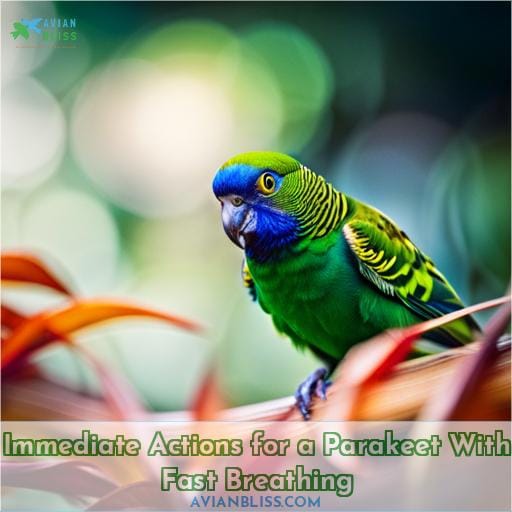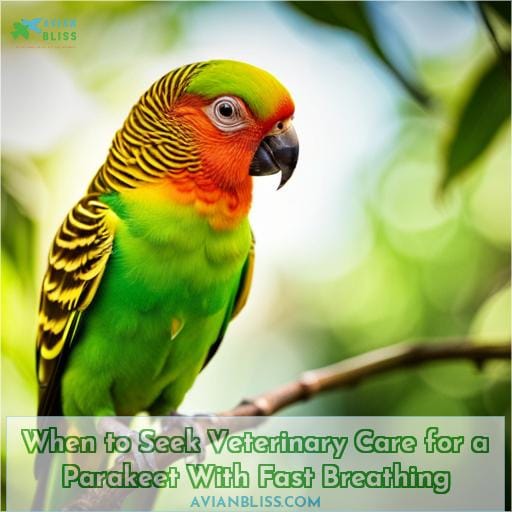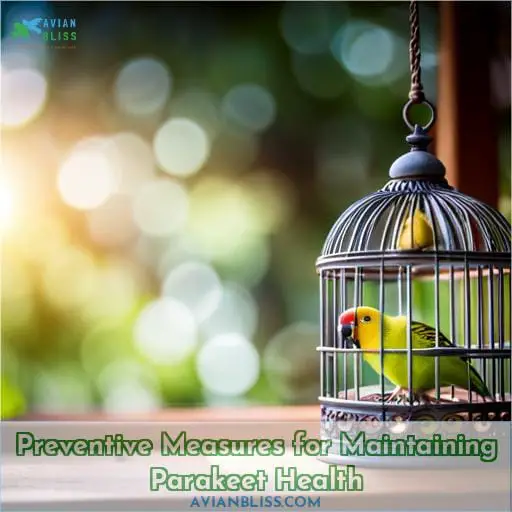This site is supported by our readers. We may earn a commission, at no cost to you, if you purchase through links.
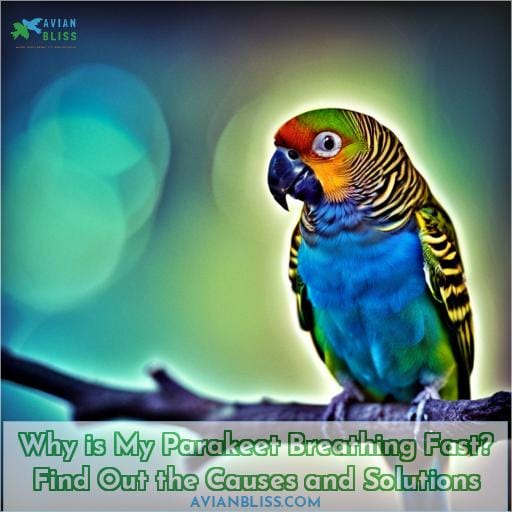 Curious about why your parakeet is breathing fast? It’s important to understand the causes and find solutions to help your feathered friend feel better.
Curious about why your parakeet is breathing fast? It’s important to understand the causes and find solutions to help your feathered friend feel better.
Rapid breathing in parakeets can be a sign of underlying health issues or stress.
- Provide a calm environment
- Maintain suitable temperatures
- Remove fearful triggers
- Ensure access to fresh water
- Encourage regular exercise
Read on to learn more about when veterinary care may be needed and preventive measures for maintaining optimal parakeet health.
Table Of Contents
- Key Takeaways
- Signs of Breathing Difficulties in Parakeets
- Causes of Fast Breathing in Parakeets
- Differentiating Between Sickness and Fear-Induced Fast Breathing
- Immediate Actions for a Parakeet With Fast Breathing
- When to Seek Veterinary Care for a Parakeet With Fast Breathing
- Preventive Measures for Maintaining Parakeet Health
- The Importance of Avian-Experienced Veterinary Care
- Frequently Asked Questions (FAQs)
- Can stress or anxiety cause fast breathing in parakeets?
- Are there any home remedies or over-the-counter medications that can help with fast breathing in parakeets?
- How long does it typically take for a parakeet with fast breathing to recover with proper veterinary care?
- Can a parakeet’s diet contribute to respiratory issues and fast breathing?
- Are there any specific environmental factors that can trigger fast breathing in parakeets?
- Conclusion
Key Takeaways
- Signs of breathing difficulties in parakeets include rapid breathing, wheezing, open-mouth breathing, gasping for air, and coughing.
- Fast breathing can be caused by overheating, stress, anxiety, fear, or illness.
- Immediate actions for parakeets with fast breathing include providing a calm environment, maintaining appropriate temperatures, removing fearful triggers, ensuring access to fresh water, and encouraging exercise.
- Preventive measures for maintaining parakeet health include a proper diet, adequate sleep, a clean cage environment, multiple feeding stations, and regular avian-experienced veterinary care.
Signs of Breathing Difficulties in Parakeets
If you notice that your parakeet is:
- Breathing rapidly
- Wheezing
- Breathing with its mouth open
- Gasping for air
- Coughing
These are signs of potential respiratory difficulties.
Rapid breathing can be indicative of various health issues such as infections or blockages in the airways.
It’s important to monitor your bird closely and seek veterinary attention promptly if any of these symptoms persist or worsen.
Rapid Breathing
Are you noticing your parakeet breathing rapidly?
Rapid breathing in parakeets can be a sign of respiratory distress or illness. It’s important to address this issue promptly to ensure the well-being of your feathered friend.
Consider factors such as:
- Stress management
- Environmental enrichment
- Dietary considerations
- Respiratory wellness
when determining the cause and finding solutions for rapid breathing in your parakeet.
Consult an avian vet for proper diagnosis and treatment options.
Wheezing Sounds
If your parakeet is experiencing wheezing sounds, it may be a sign of breathing difficulties. Wheezing in parakeets can indicate respiratory issues that require attention and care.
To address this problem, it’s important to seek veterinary care for proper diagnosis and treatment. Your vet may recommend remedies such as medication or breathing exercises to improve your parakeet’s respiratory health.
Additionally, identifying and eliminating environmental triggers can help promote overall well-being for your feathered friend.
Open-Mouthed Breathing
Frequently, you’ll notice your parakeet breathing with its mouth open, a clear sign of airway obstruction or infection causing breathing trouble.
Open-mouthed breathing in parakeets is often accompanied by other signs of respiratory distress such as rapid breathing and wheezing sounds.
If your bird exhibits this behavior, it’s crucial to seek avian veterinary care immediately to address the cause and provide appropriate treatment for their wellbeing.
Gasping for Air
When your parakeet is gasping for air, it’s crucial to seek immediate veterinary attention.
Gasping for air in birds can indicate severe respiratory distress and requires emergency care.
- Infections
- Stress
- Anxiety
- Environmental factors like poor ventilation or exposure to harmful substances
Breathing techniques and stress management can help improve respiratory health in parakeets.
Prompt medical intervention is essential to ensure the well-being of your feathered friend during this critical situation.
Coughing
If your parakeet is experiencing breathing difficulties, one of the signs to look out for is coughing.
Coughing in parakeets can be caused by various factors such as respiratory infections, allergies, or irritants in their environment.
To address this issue, it’s important to consult a vet who specializes in avian care for proper diagnosis and treatment.
Preventive measures include maintaining a clean cage environment and minimizing exposure to potential respiratory irritants.
Causes of Fast Breathing in Parakeets
Fast breathing in parakeets can be caused by several factors, including overheating or heat exhaustion.
When a parakeet is exposed to high temperatures or stressful situations, it may start breathing rapidly as a way to cool down and regulate its body temperature.
Additionally, stress or anxiety can also lead to fast breathing in parakeets as they try to cope with their environment.
Overheated or Heat Exhaustion
If your parakeet is breathing fast, one possible cause could be overheating or heat exhaustion. Environmental stressors such as high temperatures can lead to your bird experiencing difficulty in regulating its body temperature.
It’s crucial to provide cooling techniques like placing a fan near the cage or using frozen water bottles wrapped in towels for them to perch on.
Ensuring proper hydration and creating a comfortable environment are essential respiratory first aid steps that can alleviate their discomfort and reduce anxiety.
Stress or Anxiety
Stress or anxiety can trigger fast breathing in parakeets, causing them to exhibit rapid and shallow breaths.
Understanding triggers for stress and anxiety is essential in addressing this issue.
Coping with stress involves creating a calming environment through environmental enrichment and bonding techniques.
Providing behavioral solutions such as toys, perches, and interactive playtime can help alleviate their fear triggers.
Creating a safe space for your parakeet is crucial to ensuring their well-being amidst stressful situations.
Fear or Fright
When parakeets experience fear or fright, they may exhibit fast breathing more frequently.
Fear responses can trigger rapid respiration in these birds, causing them to breathe faster than usual.
This is often accompanied by other signs of anxiety such as tail bobbing and mouth breathing.
It’s important to understand that fast breathing due to fear is different from respiratory distress caused by illness.
By recognizing the indicators and implementing calming techniques, you can help alleviate your parakeet’s anxiety and promote their overall well-being.
Differentiating Between Sickness and Fear-Induced Fast Breathing
You’ll need to differentiate fast breathing caused by illness from temporary fright-induced panting through careful observation of your parakeet’s symptoms and behaviors over time.
Persistent, worsening respiratory distress indicates illness while sudden, intermittent panting often suggests a fearful reaction that resolves when the stressor is removed.
Consult an avian vet promptly if breathing difficulty continues despite environmental adjustments. They can run diagnostic tests to pinpoint respiratory infections or other issues requiring tailored treatment.
Immediate Actions for a Parakeet With Fast Breathing
When your parakeet is breathing fast, it’s important to take immediate actions to help alleviate their distress.
- Providing a calm and soothing environment can help reduce anxiety and promote relaxation.
- Maintaining appropriate temperatures in the bird’s surroundings will also ensure their comfort.
- Identifying and removing any fearful triggers can further ease their breathing,
- While ensuring access to fresh water helps keep them hydrated.
- Encouraging regular exercise through supervised playtime outside of the cage can also support respiratory health in parakeets with fast breathing.
Providing a Calm and Soothing Environment
To help alleviate your parakeet’s fast breathing, it’s important to create a calm and soothing environment.
- Provide natural lighting.
- Enrich the cage with toys.
- Allow supervised playtime.
- Use behavioral training for sociability.
These measures reduce stress and anxiety, while ensuring your bird has access to fresh water, a healthy diet, and enrichment to discourage further respiratory distress like wheezing or coughing.
Maintaining Appropriate Temperatures
After providing a calm and soothing environment, you’ll want to maintain appropriate temperatures for a parakeet exhibiting rapid breathing.
Monitor cage temperature to ensure it stays within the ideal 75-80°F range.
Look for signs of overheating like panting and adjust temperature downwards.
Avoid drafts and sudden temperature fluctuations that can stress respiratory function.
Use central heating/cooling, fans, misters etc. to optimize the environment.
Identifying and Removing Fearful Triggers
Next, you’ll need to spot and take away anything that’s frightening your parakeet and causing rapid breathing.
Assess your bird’s environment for potential fearful triggers, addressing them promptly to create a safer space. Utilize behavioral modification techniques and environmental stressor management to alleviate anxiety.
The table below offers practical examples to guide you in identifying and removing these triggers.
| Fearful Triggers | Solutions |
|---|---|
| Loud noises | Provide a quiet environment |
| Predatory visuals | Rearrange cage setup |
| Sudden movements | Slow, deliberate actions |
Ensuring Access to Fresh Water
Ensure your parakeet has constant access to fresh water, as it plays a crucial role in addressing fast breathing and maintaining overall avian health.
Hydration is vital for respiratory function and can alleviate stress-induced symptoms.
Place the water bowl strategically in the cage, ensuring it’s easily accessible.
Monitor hydration habits closely, and be aware of signs of dehydration, such as lethargy or dry skin.
High-quality water contributes to your parakeet’s well-being, promoting a healthy and active lifestyle.
Encouraging Regular Exercise
To help your parakeet with fast breathing, make sure you regularly encourage them to exercise.
Interactive playtime and enrichment activities are essential in keeping your bird active and healthy.
Consider providing flight training opportunities by allowing supervised time outside the cage or using a large indoor aviary for extended flight exercises.
Choose toys that promote physical activity, such as climbing structures or puzzle toys that require movement to obtain treats.
Socializing techniques like introducing other birds can also stimulate exercise through playful interactions.
When to Seek Veterinary Care for a Parakeet With Fast Breathing
If you notice your parakeet experiencing fast breathing, it’s crucial to seek veterinary care promptly.
Fast breathing in parakeets can be a sign of respiratory distress, which requires immediate attention.
It’s important to understand that respiratory issues can quickly escalate and become life-threatening if left untreated.
Your veterinarian will be able to assess the severity of the situation and provide emergency interventions if necessary.
They’ll also consider diagnostic considerations such as performing physical examinations, evaluating the bird’s medical history, and potentially conducting additional tests like X-rays or blood work.
Seeking professional help ensures that your parakeet receives proper treatment for their condition and increases their chances of recovery.
Preventive Measures for Maintaining Parakeet Health
To maintain your parakeet’s health and prevent respiratory issues, it’s crucial to follow a few preventive measures.
Firstly, ensure that your bird receives a proper diet and nutrition consisting of high-quality pelleted food along with dark leafy greens, cooked vegetables, and fruits.
Secondly, provide adequate sleep of 12-14 hours in a quiet environment for optimal rest.
Lastly, maintain a clean cage environment with suitable bedding and multiple feeding stations to promote overall well-being for your parakeet.
Proper Diet and Nutrition
Maintain your parakeet’s health and prevent breathing issues by providing proper diet and nutrition.
Here are some essential tips for optimal wellness:
- Offer a balanced diet: Provide a high-quality, pelleted food that meets your parakeet’s nutrient requirements.
- Include fresh fruits and vegetables: Dark leafy greens, cooked veggies, and fruits are important for healthy eating.
- Avoid seeds and unhealthy foods: Seeds can be high in fat; opt for healthier options instead.
- Ensure multiple feeding stations: This encourages regular eating habits while preventing competition among birds.
By following these dietary essentials, you can promote the overall well-being of your beloved parakeet friend.
Adequate Sleep and Rest
Ensure your parakeet gets the adequate sleep and rest it needs to maintain optimal health. Sleep patterns play a crucial role in their overall well-being, just like humans.
Create a restful environment by:
- Minimizing noise and distractions.
- Establishing a bedtime routine that includes dimming lights and providing a comfortable sleeping area for your bird.
Pay attention to sleep quality, as poor sleep can lead to stress and illness.
Consider incorporating relaxation techniques such as soothing music or gentle massage to promote deep, rejuvenating sleep for your beloved pet.
Clean and Suitable Cage Environment
To maintain your parakeet’s health, it’s important to provide a clean and suitable cage environment.
Ensure proper cage hygiene by regularly cleaning the enclosure and replacing bedding materials.
Consider environmental enrichment by providing toys, perches of various sizes, and interactive elements for mental stimulation.
Optimize the cage layout to promote exercise and flight opportunities for your parakeet.
Additionally, ensure optimal lighting conditions with access to natural light or full-spectrum artificial lighting for adequate vitamin D synthesis.
Multiple Feeding Stations
To provide optimal care for your parakeet and promote its health, it’s important to have multiple feeding stations throughout its cage.
This helps in maintaining healthy feeding habits and ensures that your parakeet has easy access to food at all times.
Additionally, having multiple feeding stations allows for behavioral enrichment as the bird can engage in natural foraging behaviors. It also encourages social interaction with cage accessories such as perches or toys located near the feeding areas.
Lastly, having multiple stations makes it easier to monitor your bird’s eating patterns and overall health.
The Importance of Avian-Experienced Veterinary Care
Maintaining the health and well-being of your parakeet involves more than just providing a proper diet and suitable living environment. When it comes to respiratory concerns or any other potential health issues, seeking avian-experienced veterinary care is crucial.
These specialized professionals have the knowledge and expertise needed to accurately diagnose and treat your feathered friend.
Avian experts understand the unique physiology of birds, including parakeets, enabling them to identify subtle signs of illness that may go unnoticed by an inexperienced eye. They can conduct thorough examinations, perform diagnostic tests such as x-rays or blood work if necessary, and provide appropriate treatments tailored specifically for your bird’s condition.
In addition to treating existing ailments in a timely manner, preventive vet visits are equally important for holistic parakeet care. Regular check-ups allow avian veterinarians to monitor your bird’s overall health status proactively while providing valuable guidance on nutrition, environmental enrichment strategies,and emergency preparedness.
By prioritizing avian-experienced veterinary care with preventive visits,you are taking essential steps towards ensuring the long-term well-beingand happinessofyourparakeet companion
Frequently Asked Questions (FAQs)
Can stress or anxiety cause fast breathing in parakeets?
Yes, stress or anxiety can cause fast breathing in parakeets. These emotions can trigger a fear response, leading to increased respiratory rate.
Creating a calm and safe environment for your parakeet can help alleviate these symptoms.
Are there any home remedies or over-the-counter medications that can help with fast breathing in parakeets?
There are no home remedies or over-the-counter medications that can effectively help with fast breathing in parakeets.
It’s crucial to seek immediate veterinary care for proper diagnosis and treatment.
How long does it typically take for a parakeet with fast breathing to recover with proper veterinary care?
With proper veterinary care, the recovery time for a parakeet with fast breathing can vary depending on the underlying cause. It’s crucial to seek immediate professional help for an accurate diagnosis and tailored treatment plan.
Can a parakeet’s diet contribute to respiratory issues and fast breathing?
Can a parakeet’s diet contribute to respiratory issues and fast breathing?
Yes, certain foods can trigger inflammation or allergies in their respiratory system.
A balanced diet with high-quality pellets and fresh vegetables is essential for maintaining their respiratory health.
Are there any specific environmental factors that can trigger fast breathing in parakeets?
Fast breathing in parakeets can be triggered by various environmental factors, such as:
- Exposure to harmful substances like air fresheners.
- Inhalation of fumes.
It’s important to create a safe and clean environment for your bird’s respiratory health.
Conclusion
To ensure your parakeet’s well-being, it’s crucial to understand why it may be breathing fast.
Rapid breathing in parakeets can be caused by health issues or stress.
By addressing the root causes and taking immediate actions, such as providing a calm environment, maintaining suitable temperatures, and removing fearful triggers, you can help your feathered friend feel better.
Additionally, ensuring access to fresh water and encouraging regular exercise are important steps in promoting optimal parakeet health.
If the fast breathing persists or worsens, it’s advisable to seek veterinary care.



